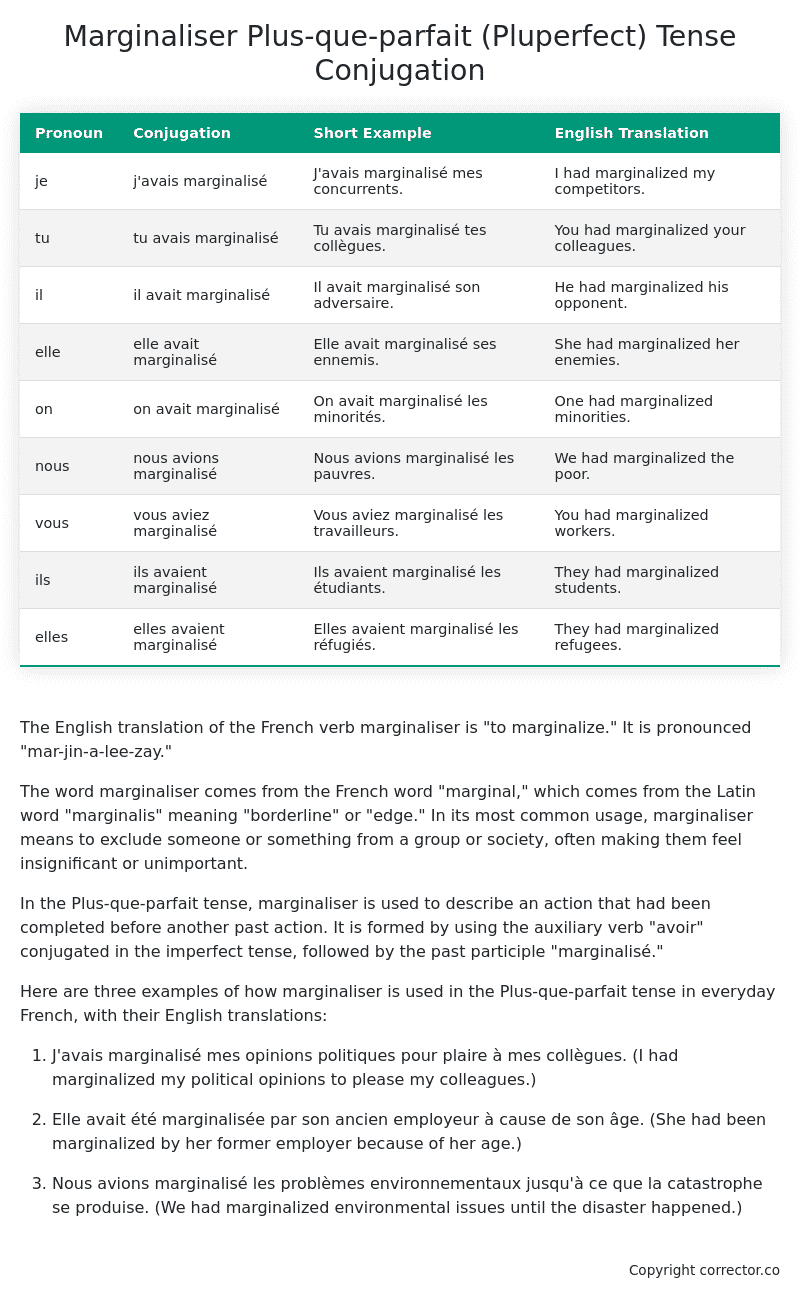Plus-que-parfait (Pluperfect) Tense Conjugation of the French Verb marginaliser
Introduction to the verb marginaliser
The English translation of the French verb marginaliser is “to marginalize.” It is pronounced “mar-jin-a-lee-zay.”
The word marginaliser comes from the French word “marginal,” which comes from the Latin word “marginalis” meaning “borderline” or “edge.” In its most common usage, marginaliser means to exclude someone or something from a group or society, often making them feel insignificant or unimportant.
In the Plus-que-parfait tense, marginaliser is used to describe an action that had been completed before another past action. It is formed by using the auxiliary verb “avoir” conjugated in the imperfect tense, followed by the past participle “marginalisé.”
Here are three examples of how marginaliser is used in the Plus-que-parfait tense in everyday French, with their English translations:
-
J’avais marginalisé mes opinions politiques pour plaire à mes collègues. (I had marginalized my political opinions to please my colleagues.)
-
Elle avait été marginalisée par son ancien employeur à cause de son âge. (She had been marginalized by her former employer because of her age.)
-
Nous avions marginalisé les problèmes environnementaux jusqu’à ce que la catastrophe se produise. (We had marginalized environmental issues until the disaster happened.)
Table of the Plus-que-parfait (Pluperfect) Tense Conjugation of marginaliser
| Pronoun | Conjugation | Short Example | English Translation |
|---|---|---|---|
| je | j’avais marginalisé | J’avais marginalisé mes concurrents. | I had marginalized my competitors. |
| tu | tu avais marginalisé | Tu avais marginalisé tes collègues. | You had marginalized your colleagues. |
| il | il avait marginalisé | Il avait marginalisé son adversaire. | He had marginalized his opponent. |
| elle | elle avait marginalisé | Elle avait marginalisé ses ennemis. | She had marginalized her enemies. |
| on | on avait marginalisé | On avait marginalisé les minorités. | One had marginalized minorities. |
| nous | nous avions marginalisé | Nous avions marginalisé les pauvres. | We had marginalized the poor. |
| vous | vous aviez marginalisé | Vous aviez marginalisé les travailleurs. | You had marginalized workers. |
| ils | ils avaient marginalisé | Ils avaient marginalisé les étudiants. | They had marginalized students. |
| elles | elles avaient marginalisé | Elles avaient marginalisé les réfugiés. | They had marginalized refugees. |
Other Conjugations for Marginaliser.
Le Present (Present Tense) Conjugation of the French Verb marginaliser
Imparfait (Imperfect) Tense Conjugation of the French Verb marginaliser
Passé Simple (Simple Past) Tense Conjugation of the French Verb marginaliser
Passé Composé (Present Perfect) Tense Conjugation of the French Verb marginaliser
Futur Simple (Simple Future) Tense Conjugation of the French Verb marginaliser
Futur Proche (Near Future) Tense Conjugation of the French Verb marginaliser
Plus-que-parfait (Pluperfect) Tense Conjugation of the French Verb marginaliser (this article)
Passé Antérieur (Past Anterior) Tense Conjugation of the French Verb marginaliser
Futur Antérieur (Future Anterior) Tense Conjugation of the French Verb marginaliser
Subjonctif Présent (Subjunctive Present) Tense Conjugation of the French Verb marginaliser
Subjonctif Passé (Subjunctive Past) Tense Conjugation of the French Verb marginaliser
Subjonctif Imparfait (Subjunctive Imperfect) Tense Conjugation of the French Verb marginaliser
Conditionnel Présent (Conditional Present) Tense Conjugation of the French Verb marginaliser
Conditionnel Passé (Conditional Past) Tense Conjugation of the French Verb marginaliser
L’impératif Présent (Imperative Present) Tense Conjugation of the French Verb marginaliser
L’infinitif Présent (Infinitive Present) Tense Conjugation of the French Verb marginaliser
Struggling with French verbs or the language in general? Why not use our free French Grammar Checker – no registration required!
Get a FREE Download Study Sheet of this Conjugation 🔥
Simply right click the image below, click “save image” and get your free reference for the marginaliser Plus-que-parfait tense conjugation!

Marginaliser – About the French Plus-que-parfait (Pluperfect) Tense
Tense Formation
Common everyday usage patterns
Sequencing of past events
Background information
Hypothetical or reported speech
Interactions with other tenses
Summary
I hope you enjoyed this article on the verb marginaliser. Still in a learning mood? Check out another TOTALLY random French verb conjugation!


